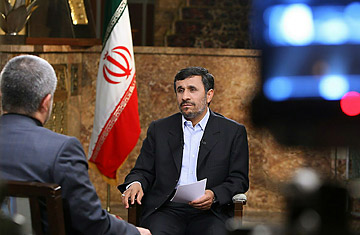
A picture released by the official website of the Iranian presidency shows Iranian President Mahmoud Ahmadinejad listening to a question during an interview broadcast live on state television in Tehran on December 18, 2010.
By declaring that Iran remains at least four years away from nuclear-weapons capability, the outgoing head of Israel's Mossad intelligence agency has surely helped ease pressure on the Obama Administration to escalate the showdown with Tehran. So much so, in fact, that Secretary of State Hillary Clinton found herself having to urge Gulf Arab states on Sunday to avoid easing off on sanctions against Iran, while Israeli Prime Minister Benjamin Netanyahu — who some Israeli papers reported was angered by his intelligence chief's pronouncement — again pressed the U.S. to put a "credible military option" on the table, and on Tuesday dismissed Dagan's assessment as nothing more than "an estimate".
Handing over the reins at the Mossad to Tamir Pardo, outgoing head Meir Dagan had last Thursday told Israel's parliament that as a result of setbacks in Tehran's program (some possibly resulting from sabotage), "Iran will not achieve a nuclear bomb before 2015, if that." He also told legislators that "Israel should not hasten to attack Iran, doing so only when the sword is upon its neck".
In an interview with the German magazine Der Spiegel published this week, the U.S.-backed head of the International Atomic Energy Agency, Yukiya Amano was forthright in criticizing Iran's failure to fully cooperate with the watchdog body. But when asked about estimates that Iran was just a year away from building a bomb, he answered, "I'm not so sure about that. Despite all unanswered questions, we cannot say that Iran is pursuing a nuclear weapons program." He was forthright.
Dagan's assessment has also vindicated the skepticism of some U.S. officials over previous, more alarmist Israeli assessments. In a November 2009 U.S. diplomatic cable released by WikiLeaks, a warning by the head of the research directorate of Israeli military intelligence, Gen. Yossi Baidatz, that Iran would be able to build a nuclear weapon within a year, was accompanied by the following insert: "It is unclear if the Israelis firmly believe this or are using worst-case estimates to raise greater urgency from the United States." The latest timeline from Dagan appears to signal a turn away from worst-case assessments. And that will be welcome news for the Obama Administration, whose achievements in imposing sanctions, while having a significant effect on Iran's economy, are unlikely to break the nuclear stalemate any time soon.
The immediate focus of the dispute now shifts to talks in Istanbul on Jan. 24 between Western diplomats and Iranian officials. Their purpose is to seek measures to build confidence between the two sides, most notably the revival of a fuel-swap deal that was negotiated but then rejected by Iran late in 2009, and then embraced by Iran in amended form last Spring via Turkish and Brazilian mediation, but rejected by the U.S. and its partners. The difficulties of brokering such an agreement were underscored this week in a diplomatic cable publicized by WikiLeaks, outlining the domestic political difficulties President Mahmoud Ahmadinejad would face if he was inclined to deal. The cable reports on a conversation late in 2009 between Assistant Secretary of State Philip Gordon and Turkey's Foreign Minister Ahmet Davutoglu, based on the Turkish leader's frank talks with the Iranians. Davutoglu reveals that Ahmadinejad is "more flexible" than some of his rivals in Tehran, and had accepted the original fuel-swap deal agreed with Western powers in Vienna in November of 2009 — but was stymied when his opponents in Tehran painted the deal as "a virtual defeat."
The takeaway from the Turkey-Iran conversation, the cable reports, is that Tehran's objection to the Vienna deal was "psychological rather substance," and that winning Iranian backing for a revived version of that deal to be discussed in the coming talks will require deft management of "the public perception" in Iran. In short, it can't be made to look like a defeat for Iran. Quite the contrary in Washington, of course, where President Barack Obama faces growing pressure from a more hawkish legislature to take a harder line on Iran, and anything that can be painted as a concession to Tehran will almost certainly be pilloried on Capitol Hill.
Optimism over a breakthrough in talks remains limited, with the U.S. and its allies relying on the corrosive effect of sanctions on Iran's economy to slowly raise the pressure on Tehran, while the Iranians seek to leverage their position as the world's fifth-largest oil supplier in a tightening global market to offset economic pressure. On both sides, it's a long game, with Iran trying to work the differences between the U.S. and its closest allies, on the one hand, and the likes of China, Russia, Turkey and Brazil on the other over tactics and what constitutes an acceptable outcome to the standoff.
While Washington will continue to escalate the unilateral sanctions it believes are putting the squeeze on Iran's leaders, even in the best-case scenario such measures take months or even years to have their desired effect. And there's unlikely to be support for new measures at the Security Council absent any new violation by Iran of NPT rules. In short, 2011 is more likely to see the standoff in something of a holding pattern than nearing resolution. Good thing, then, that the Israeli intelligence establishment has made clear that there's no imminent danger of Iran building a nuclear weapon.
